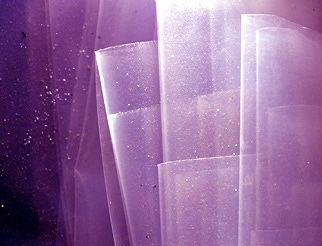John Henry Company Implements New Plastic Recycling Program
January 30, 2014

GOEX Corp, a leading manufacturer of quality printable plastic sheet, has announced that The John Henry Company, a division of Multi Packaging Solutions, is among the first companies to participate in the GOEX Corporation’s breakthrough “closed-loop” plastic recycling program.
“John Henry supplies plant tags, merchandising, and marketing solutions to growers, greenhouses and garden centers, as well as to florists and wholesale floral operations,” says Jon Luea, John Henry’s Product Development Manager for Grower Plastics.
“Recognizing the industry’s interest in sustainable practices, we have worked to develop recycled products, plastic alternatives, and recycling programs for our customers. Our closed-loop program with GOEX is the second recycling program we’ve implemented this year, following the Blackmore program we recently announced to collect clean styrene tags from growers and garden centers and recycle them to produce plant trays. The GOEX program is helping us focus upstream to combine sustainable manufacturing practices with recycled products.” Although John Henry has recycled paper and plastic scrap for years, “This is the first time we’ve worked with the extruder to reintroduce it as a product. It’s a very exciting opportunity.” Luea says.
GOEX promotes its “zero landfill” program as an opportunity for customers like John Henry to extract value from processed plastics they previously regarded as waste. With proper handling procedures in place, plastic scrap (makeready waste, finished scrap, etc.) can be collected, recycled, enhanced with virgin raw material and extruded into a functional, printable plastic sheet that customers can use over and over again.
Gone, but Not Forgotten
“The John Henry R&D team evaluated numerous materials options, including ‘biodegradable’ and recycled plastics. We concluded that the GOEX solution using recycled plastic was a more viable solution for customers trying to balance sustainability and costs,” Luea says. “There are biodegradable plastics such as PLA available, but research shows that these materials do not fully decompose and are relatively expensive with limited availability,” he explains. “While these materials partially degrade, they leave behind microscopic pieces of plastic that never go away and won’t revert to organic matter, creating a long-term problem. Short-term, you feel pretty good about it, but if there’s a better solution, you should look at it. That’s what recycling is all about, and GOEX has been a huge help in making this happen.”
John Henry currently prints on three types of virgin plastic material: Polystyrene, HDPE (High Density Polyethylene) and Polypropylene, which are used primarily in the manufacture of plant tags. Of these, GOEX Polystyrene is the only material for which the company has set up a recycling program thus far.
When the GOEX program is fully implemented, the company expects to recycle 30 to 40 percent of John Henry production scrap Polystyrene into litho-grade material.
The imminent launch of the John Henry program marks the culmination of a period of intensive testing to ensure that the recycled material can withstand the extreme environmental conditions typical of most growing environments. “We have a weather chamber and lab on-site that we use to determine how the material will perform under conditions typical of the environments we supply into. This includes intense UV sunlight comparable to conditions in southern Florida, high and low humidity – it even rains in there,” Luea says. “Our testing of the GOEX recycled material has shown that it performs wonderfully under all conditions found in horticultural environments. We also found that it would cost considerably less to change our processing than we had anticipated. The recycled product from GOEX is on track to be our flagship substrate.”
Process Discipline Required
“The biggest challenge to setting up the GOEX program has been working on the process of returning scrap material to GOEX in order to be recycled into John Henry tags,” Luea says. “To that end, all of the material to be reused is shredded and loaded into individually labeled gaylord containers right off the end of the press and loaded directly into trucks.” With the materials thus quarantined,” he adds, “there is no point at which the scrap could become contaminated with foreign matter or dissimilar polymers.”
In response to growing customer demand for “green” product options, John Henry now offers five different eco-friendly materials ranging from paper and paper composites all the way to GOEX recycled Polystyrene, which it expects will become a popular choice with like-minded customers. Every product made with recyclable material will be marked with a logo; otherwise, the finished recycled tags will look identical to the original and perform to similar specifications.
As John Henry prepares to promote its new capability, Luea provides a glimpse into the future of plastic recycling from a horticultural perspective:
“The ideal would be for recycling centers to be set up at every garden center and greenhouse. If every pot and plant tag – ours as well as the competition’s – were marked with the appropriate recycling symbol, customers could take their used pots and tags back to that garden center and drop them off to be recycled again. We view the closed-loop manufacturing model developed by GOEX and pioneered by John Henry as a major step toward a sustainable future.”
Source: GOEX
Click Here Now to Get FREE Newsletters from Packaging Digest
.
You May Also Like


